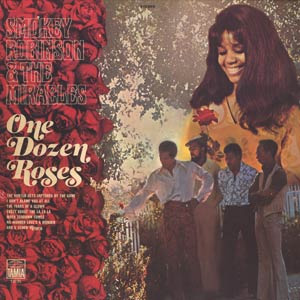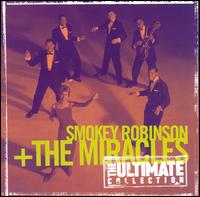"Going to a Go-Go" is a 1965 single recorded by The Miracles for Motown's Tamla label.

I'll Try Something New is the third album by The Miracles. It was released on the Tamla label, a subsidiary of Motown. The title track was an important early single for the group, featuring Smokey Robinson's lead voice, a chorus led by his wife Claudette and an orchestra of strings. Other hits like "What's So Good About Goodbye" and "I've Been Good To You" are included, plus three covers of easy listening standards: "I've Got You Under My Skin" written by Cole Porter, "On the Street Where You Live" from the Broadway musical My Fair Lady, and "Speak Low" by Ogden Nash and Kurt Weill, on which both Smokey and Claudette Robinson sing lead. I'll Try Something New also features a rare lead by Miracles baritone Ronnie White on "A Love That Can Never Be", and a lead by Claudette Robinson on "He Don't Care About Me".

Greatest Hits from the Beginning is a compilation double LP by The Miracles released in 1965. This was the first double album ever released by the Motown Record Corporation. It covers most of the group's hits from their pre-1965 albums, such as "Shop Around", "Who's Lovin’ You", "You've Really Got A Hold On Me" and "Mickey's Monkey", as well as the non-album singles from 1964: "I Like It Like That" and "That's What Love Is Made Of". The album was a success, reaching #21 on the Billboard Pop Album Chart. It was also the first Miracles album to chart on the Billboard R&B Album chart, where it was an even bigger success, peaking at #2.
"Doggone Right" is a 1969 single recorded by The Miracles for the Tamla label. Written by Miracles members Smokey Robinson and Marv Tarplin along with Motown staff songwriter Al Cleveland and produced by Robinson, the single peaked at number 32 on the Billboard Hot 100 in the United States. It was also a Top 10 R&B hit, peaking at #7. "Doggone Right" was the A-side to the double-sided Miracles' hit single, Tamla T54183. "Here I Go Again", contrary to popular belief, was the "B" side, although both sides charted within the top 40 of the Hot 100.

One Dozen Roses is a 1971 album by Smokey Robinson & The Miracles, issued on Motown Records' Tamla label. The penultimate album before lead singer Smokey Robinson departed the group for a solo career, One Dozen Roses features the Top 20 Billboard Hot 100 hit single "I Don't Blame You at All". Also included is the group's number-one smash hit "The Tears of a Clown", which was also made available through the reissue of the 1967 Miracles LP Make It Happen as The Tears of a Clown. Both of these songs were also huge hits in the UK, reaching #11 and #1 respectively.
"If You Can Want" is a 1968 single recorded by R&B group Smokey Robinson & the Miracles for Motown Records' Tamla label. Written and produced by Miracles lead singer Smokey Robinson, "If You Can Want" was the most successful of the three singles included on the group's 1968 album Special Occasion. This single just missed the U.S. Top 10, peaking at number 11 on the Billboard Hot 100 in the United States, and was a Top 5 R&B hit, peaking at number three on Billboard's R&B singles chart, and was also a minor hit in England, peaking at number 50 on the United Kingdom singles chart.
"The Love I Saw in You Was Just a Mirage" is a 1967 song recorded by the American R&B group The Miracles on Motown Records' Tamla label. Written by Miracles members Smokey Robinson and Marv Tarplin and produced by Robinson, it is noted for being the first single to bill the group as "Smokey Robinson" & the Miracles, a billing already present on the group's albums by this time. Miracles members Smokey Robinson and Pete Moore were the song's producers.
"I've Been Good to You" is a 1961 R&B song by The Miracles on Motown Records' Tamla label. It was released as the B-side of their Billboard Top 40 hit, "What's So Good About Goodbye", and was included on their album I'll Try Something New the following year. This sad, melancholy ballad charted #103 on the Billboard Pop chart. Despite its relatively modest chart placing, this song has been hugely influential, and is noted as Beatle John Lennon's favorite Miracles tune, and was the inspiration for The Beatles' songs "This Boy" and "Sexy Sadie". Written by Miracles lead singer Smokey Robinson, the song begins with the lyric, "Look what you've done...You've made a fool out of someone..." which Lennon later paraphrased in Sexy Sadie song as, "What have you done...You've made a fool of everyone."

Renaissance is a 1973 album by R&B group The Miracles on Motown Records' Tamla label. It was the first album by the group not to feature original lead singer Smokey Robinson on lead vocals, instead featuring him as executive producer. Robinson was replaced by lead singer Billy Griffin.
"After All" is a 1960 song written by Smokey Robinson and originally recorded and released by The Miracles on the Tamla label. It was first recorded as an unreleased single by The Supremes for Tamla; it was supposed to be their first single but it was canceled in favor of "I Want a Guy", and their cover wasn't released until it appeared on the 2000 box set, The Supremes. The song is noted for both groups' unusual choices for leads. For the Miracles' version it serves as a rare lead for Claudette Rogers Robinson, instead of the group’s main lead, Claudette's husband, Smokey Robinson. In the Supremes' case it is their only single to feature Barbara Martin singing on lead vocals. Florence Ballard, Mary Wilson, and Diana Ross sing verses, and Martin sings the bridge. "After All" was also later covered by The Marvelettes, in the early 1970s, with group member Wanda Young Rogers as lead. Their version appears on the album The Return of the Marvelettes, and later became the group's belated final single.
"Come On Do the Jerk" was a 1964 song recorded by R&B group the Miracles on Motown Records' Tamla label subsidiary. It was co-written by Miracles members Pete Moore, Bobby Rogers and Smokey Robinson and drummer Donald Whited. A single-only release, it did not appear on any original Miracles studio album, and was the group's last single release of 1964. Robinson and fellow Miracle Bobby Rogers were the song's producers. The flip side, "Baby Don't You Go", was also a popular regional hit but was not released on CD until The 35th Anniversary Collection in 1994. Both sides of this single received new stereo mixes for the 2002 compilation Ooo Baby Baby: The Anthology.

"Yester Love" was a 1968 song by Motown Records R&B group The Miracles on its Tamla subsidiary label. It was recorded on December 18, 1967, and was included on the group's album, Special Occasion.

The Miracles – Depend On Me: The Early Albums is a 2009 double-CD limited release by Motown Records' original vocal group The Miracles, released through Universal's Hip-O Select imprint to coincide with the legendary Motown label's 50th anniversary. In addition, this collection's release also coincided with The Miracles' being honored with a star on the Hollywood Walk of Fame on March 20 of that year.

The Ultimate Collection is a compact disc by Smokey Robinson and The Miracles, released on Motown Records, catalogue 314530857-2, in February 1998. It is a collection of singles comprising many of the group's greatest hits, with liner notes written by Stu Hackel.
"Point It Out" is a 1969 recording by Motown Records R&B group The Miracles on that label's Tamla subsidiary. This mid-tempo song was a national Billboard Top 40 Pop hit, reaching #37 on the Hot 100, and was a Top 10 R&B hit was well, reaching #4. It was taken from their album "A Pocket Full Of Miracles", and was written by Miracles members William "Smokey" Robinson and Marv Tarplin, along with Motown staff songwriter Al Cleveland.

Smokey Robinson & the Miracles LIVE! (TS289) is a 1969 album by R&B group The Miracles. Issued on Motown's Tamla label, it is the second of three live albums the Miracles recorded during their career. The album was recorded in 1968 at Detroit's famous Roostertail Restaurant, a popular venue where Motown artists appeared during the 1960s and 1970s. Released January 6, 1969, it charted at #71 on the Billboard Pop Album Chart and peaked at #7 on the Billboard R&B Album Chart.
"(You Can't Let the Boy Overpower) The Man in You" is a 1964 R&B song by the Miracles on Motown Records' Tamla subsidiary label. It was written by Miracles lead singer Bill "Smokey" Robinson, and was produced by Robinson and Motown president/founder Berry Gordy Jr. One of several gospel-styled call and response tunes the group issued in 1964, this song reached number 59 on the Billboard Pop chart, and the top 20 of the Cash Box R&B chart, peaking at number 12. The song was recorded on August 17, 1963, and was the group's first single release of 1964.
We've Come Too Far to End It Now was a 1972 single by Motown Records R&B group The Miracles on its Tamla Label subsidiary (T54220F) and taken from their 1972 album, Flying High Together, the group's final studio album with original lead singer Smokey Robinson. This song charted at #46 on the Billboard Pop Chart, and reached the Top 10 of its R&B chart, peaking at #9.
"Happy Landing" is a 1962 R&B recording by Motown Records singing group The Miracles, issued on that label's Tamla Records subsidiary label (T54073). It was recorded in November 1962, and appeared on their album The Fabulous Miracles. The group also recorded a live version of this song on their first live album, 1963's The Miracles Recorded Live on Stage.
"Come Spy With Me" (T54145) was a 1967 song recorded by Motown Records R&B group The Miracles, released on its Tamla Records subsidiary label. The B-side of the group's Top 20 hit single "The Love I Saw in You Was Just a Mirage", it was written by Miracles lead singer Smokey Robinson, and was the original titular theme song from the 1967 20th Century Fox feature film of the same name, starring Troy Donahue and Andrea Dromm.







